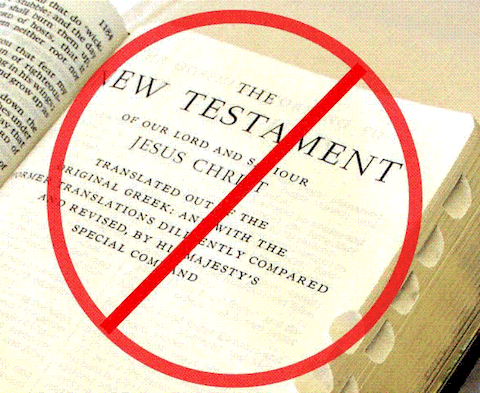
1001 Errors in the Christian Bible
Home
Dedication
Matthew
Mark
Luke
John
Acts
Contact Us
Acts -- Errors 719-725
#719
Acts 13: (KJV)
27 “For they that dwell at Jerusalem, and their rulers, because
they knew him not, nor yet the voices of the prophets which are read every
sabbath day, they have fulfilled them in condemning him.
28 And though they found no cause of death in him, yet desired they Pilate
that he should be slain.
29 And when they had fulfilled all that was written of him, they took
him down from the tree, and laid him in a sepulchre.”
Compare to Luke 23: (KJV)
50 “And, behold, there was a man named Joseph, a counsellor; and
he was a good man, and a just:
51 (The same had not consented to the counsel and deed of them;) he was
of Arimathaea, a city of the Jews: who also himself waited for the kingdom
of God.
52 This man went unto Pilate, and begged the body of Jesus.
53 And he took it down, and wrapped it in linen, and laid it in a sepulchre
that was hewn in stone, wherein never man before was laid.”
According to “Act’s” “Luke” “The Jews”
who condemned Jesus laid him to rest. According to “Luke’s”
“Luke” an individual who did not condemn Jesus (Joseph) laid
him to rest.
# 720
Acts 13: (KJV)
32 “And we declare unto you glad tidings, how that the promise
which was made unto the fathers,
33 God hath fulfilled the same unto us their children, in that he hath
raised up Jesus again; as it is also written in the second psalm, Thou
art my Son, this day have I begotten thee.”
Regarding “God hath fulfilled the same unto us their children”
the manuscript evidence is
“God hath fulfilled the same unto our children” which almost
no modern uses. There is tremendous manuscript and translation variation
here which is normally a Sign of copyists trying to fix an error in the
original. So “Luke’s” Paul, in his big speech, claims that
the Sign was fulfilled to the children of his generation rather than his
generation. Guess he was caught up in the moment.
# 721
Acts 13: (KJV)
32 “And we declare unto you glad tidings, how that the promise
which was made unto the fathers,
33 God hath fulfilled the same unto us their children, in that he hath
raised up Jesus again; as it is also written in the second psalm, Thou
art my Son, this day have I begotten thee.”
There’s nothing in the second Psalm about the resurrection of a dead
Messiah. The quote is especially bizarre coming from someone (“Luke”)
who supposedly wrote that Jesus was born the son of god. Marcion tells
me this is more evidence that the “virgin birth” in “Luke”
was not original.
# 722
Acts 13: (KJV)
34 “And as concerning that he raised him up from the dead, now
no more to return to corruption, he said on this wise, I will give you
the sure mercies of David.”
This refers to Isaiah 55: (KJV)
3 “Incline your ear, and come unto me: hear, and your soul shall
live; and I will make an everlasting covenant with you, even the sure
mercies of David.”
“Luke” seems to have forgotten the “everlasting covenant”
from the Jewish Bible.
# 723
Acts 13: (KJV)
35 “Wherefore he saith also in another psalm, Thou shalt not suffer
thine Holy One to see corruption.”
This cannot be found in any Psalm. Apparently the original Hebrew suffered
corruption at the time it was read by “Luke”.
# 724
Acts 13: (KJV)
39 “And by him all that believe are justified from all things,
from which ye could not be justified by the law of Moses.”
Homework assignment. See how many references you can find in the Tanakh
to justification by the law of Moses and how many references you can find
that the law of Moses can not justify.
# 725
Acts 13: (KJV)
40 “Beware therefore, lest that come upon you, which is spoken
of in the prophets;
41 Behold, ye despisers, and wonder, and perish: for I work a work in
your days, a work which ye shall in no wise believe, though a man declare
it unto you.”
Refers to:
Habakkuk 1: (JPS)
5 “Look ye among the nations, and behold, and wonder marvellously;
for, behold, a work shall be wrought in your days, which ye will not believe
though it be told you.
6 For, lo, I raise up the Chaldeans, that bitter and impetuous nation,
that march through the breadth of the earth, to possess dwelling-places
that are not theirs.”
The Habakkuk reference explicitly refers to Habakkuk’s time, is seen
in the nations, lacks “despisers” and “perish” and
does not have “prophets” as a source. Other than all that it’s
a perfect match.